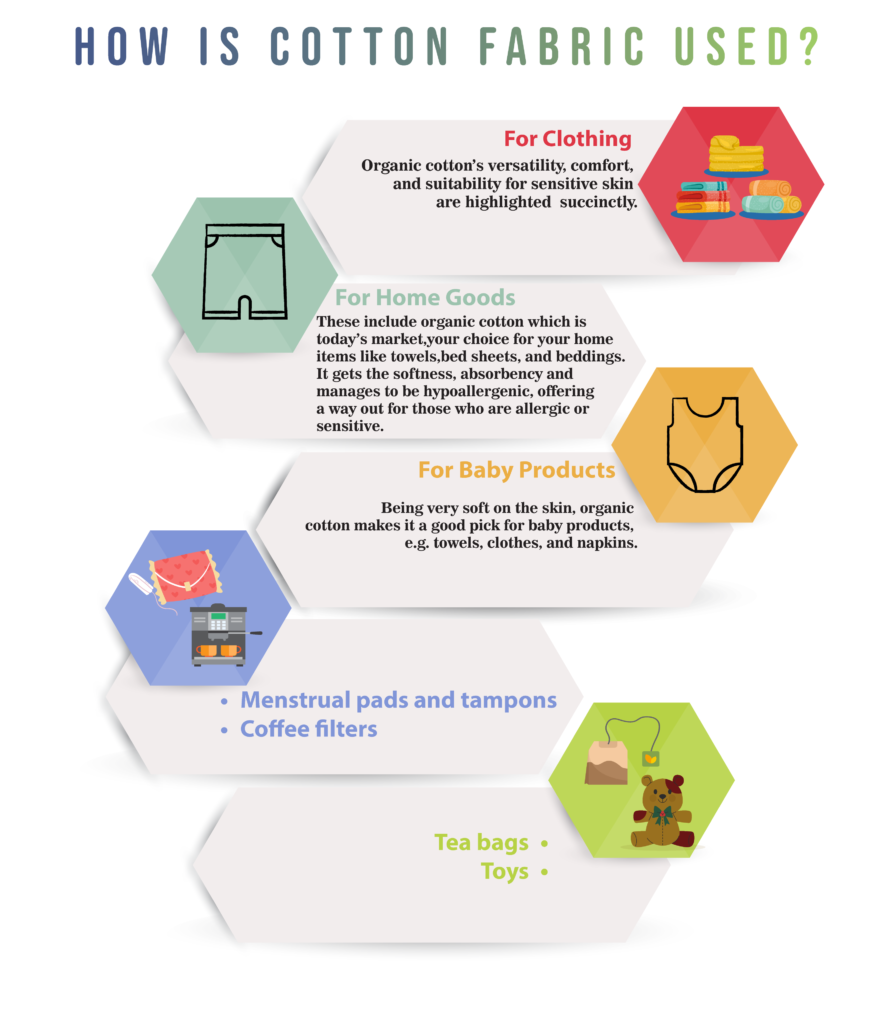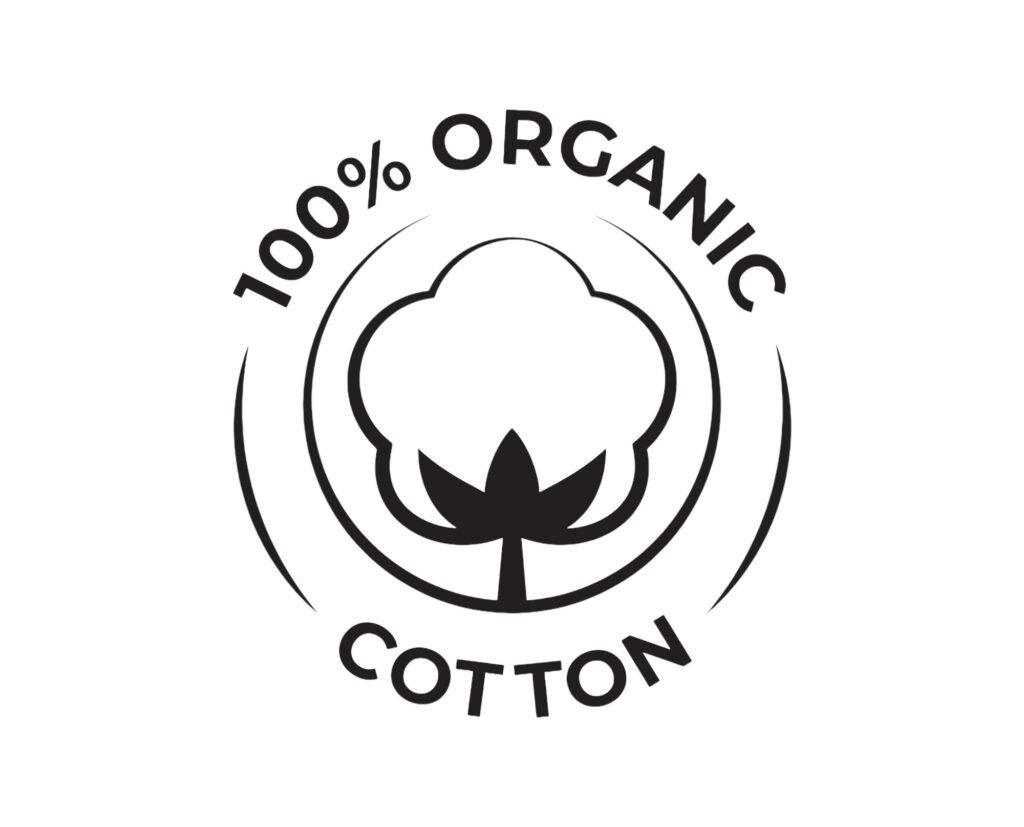What is Organic Cotton?
- Organic Cotton
Furthermore, it is important to note that organic fabric is produced naturally using natural fertilisers instead of chemically compounded fertilisers and chemicals. Second, it is manufactured using environmental-friendly processes, equipment, and supplies. According to one of its principles, cottons production implies support and stimulation of biodiversity and natural biological cycles.
- Benefits of Organic Fabric Cotton
Organic cotton has several benefits:
1. Environmentally Friendly: Compared to conventional cotton, the organic cottons is done using less water and energy. Moreover, it has less effect on the environment.
2. Health Benefits: Hypoallergenic organic cotton is hence perfect even for those with delicate complexion. Moreover, it happens to be breathable; hence suitable for sports wears and for those who require well-ventilated clothes during their activities.
3. Durability: Conventional cotton has limited lifespan, while organic cottons is stronger and long lasting .
- Differences between organic Fabric cotton and conventional cotton fabrics.
Both organic Fabric cottons and conventional cottons are produced from the same plant, but their production differs at each stage of growing, watering, weeding, harvesting, and manufacturing. Cotton is also soft, durable, airy, and, in the second place,cottons has better environmental properties than cotton. Sustainable measures in growing cottons includes crop rotations unlike depletion of the soil. Instead of planting the same crop in the same land every year and adding chemical fertilizer to make up for lost minerals.
- Certifications for Organic Fabric
Some of these certifications include Global Organic Textile Standard, Oeko Tex Standard 100, USDA-Certified Organic, Organic Content Standard, Better Cottons Initiative amongst others, and blue sign organic rating. Product should consist of more than 95% of the organic fibers to meet the requirements of GOTS organic certificate
From T-shirts to Tablecloths: A Versatile Fabric for Everyday Life
Organic cotton’s versatility knows no bounds. It can be found in a wide range of:
- Clothing: From comfy T-shirts and dresses to luxurious bedding and towels, organic Fabric cotton offers comfort and style for the whole family.
- Home Textiles: Curtains, tablecloths, and throws made from organic cotton bring a touch of sustainability and softness to your living space.
- Baby & Children’s Products: Gentle on delicate skin, organic Fabric cotton is ideal for baby clothes, bedding, and accessories.
The Future is Organic: A Growing Movement
As consumers become more aware of the impact of their choices, the demand for organic Fabric cotton is steadily rising. Fashion brands are embracing sustainable practices, offering organic Fabric cotton collections that cater to the eco-conscious shopper.
Making a Difference, One Thread at a Time
Choosing organic cotton is not just a fashion statement; it’s a conscious decision to support a healthier planet and fairer labor practices. Every purchase you make has the power to contribute to a more sustainable future. So, the next time you’re shopping for clothes, towels, or home goods, consider making the switch to organic cotton and experience the comfort that cares.
Remember:
- Look for certifications like GOTS (Global Organic Textile Standard) to ensure the authenticity of organic Fabric cotton products.
- Support brands committed to sustainable practices and transparency.
- Spread awareness about the benefits of organic cotton and encourage others to make conscious choices.
Buy Organic Cotton Fabric:
How is Organic Cotton Used?

- Clothing: Organic Fabric cotton is frequently sported as clothing of all genres, from lightweight cotton for t-shirts and jeans to heavier organic Fabric cotton for suits and dresses. Featuring cotton and other breathable and naturally comfortable fabrics, also the durability, having the strength to withstand frequent washing, are the features which make this wear perfect. As it is in the point of caution about the aggravation of the skin of hypersensitive people, organic cotton is a perfect choice.
- Home Goods: These include organic Fabric cotton which is today’s market,your choice for your home items like towels,bed sheets, and beddings. It gets the softness, absorbency, and manages to be hypoallergenic, offering a way out for those who are allergic or sensitive.
- Baby Products: Being very soft on the skin, organic Fabric cotton makes it a good pick for baby products, e.g. towels, clothes, and napkins.
- Menstrual pads and tampons
- Coffee filters
- Tea bags
- Toys
Is Organic Cotton Same as Cotton?
When shopping for clothing or home textiles, you might come across labels that say “organic cotton” and wonder how it differs from regular cotton. While both types of cotton come from the same plant, there are significant differences in how they are grown, processed, and their impact on the environment.
Growing Practices
Regular Cotton: Conventional cotton farming often involves the use of synthetic pesticides, fertilizers, and genetically modified seeds. These practices can lead to soil degradation, water contamination, and harm to local ecosystems.
Organic Cotton: Organic cotton is grown without synthetic chemicals or genetically modified organisms (GMOs). Farmers use natural fertilizers and pest control methods, and they often rotate crops to maintain soil health.
Cotton & Organic Cotton
Where to Buy 100% Organic Cotton Fabric?

If you’re looking for 100% organic cotton fabric, the best place to buy it is Only Symphony Fabric. They offer a wide range of high-quality, eco-friendly fabrics perfect for all your sewing needs.
When it comes to sustainable and high-quality textiles, Symphony Fabric’s 100% Organic Cotton is a top choice for discerning customers. Here’s why you should consider their organic Fabric cotton for your next project:
Why choose Symphony Fabric’s Organic Cotton?
Eco-Friendly and Sustainable:
Organic cotton by Symphony Fabric has no pesticide and synthetic fertilizer used for its growth hence the environment is healthier. So, every time you select Buy Organic Fabric from Symphony fabric, you’re contributing to farming practices that helps in improving the health of the soil, save water and support biological diversification.
Premium Quality
The 100% Organic Fabric is the newest product of Symphony Fabric that offers pretty softness and sustainability. The natural fibers do not cause skin irritation hence it can be used in wear, bedsheets, baby wears, and diapers. This will make your products durable and have a good appeal for many years without fading or shrinking the same is true for the comfort they provide.
Chemical-Free Assurance
Another riveting quality of the organic Fabric cotton used by Symphony Fabric is that their organic Fabric cotton is pure. Without a chemical wash, this fabric is suitable for wearing by sensitive skin or individuals with allergic germs. Organic Fabric cotton is processed with toxic dyes and finishes which Symphony Fabric assures you that the product does not contain.
Versatile and Stylish
Symphony Fabric provides organic Fabric cotton and include various fabrics with different weights and weave and different colors. If you are in need of sheer lightweight cotton for your summertime dresses or more sturdier materials for furniture, there is something for everyone’s taste. The variations in the color of their organic Fabric cotton make it possible to use it in fashion and homes.
Ethically Produced
The company has vowed to perform all the manufacture of its garments in an ethical manner. Its organic content is grown through farm practices that respect staff rights and pay them reasonable wages. So that team Symphony Fabric ensures it complies with human rights in the production of their fabrics besides promoting ethical business.
For those who require bulk purchases, Symphony Fabric has provided organic cotton Fabric wholesale purposes. This is especially ideal for businesses and designers and anyone who might be looking forward to buying organic Fabric cotton in large quantities. When it comes to ordering wholesale products, Symphony Fabric will provide you with great discounts and cut price whilst still maintaining the quality you are looking for.
GOTS Certified: GOTS (Global Organic Textile Standard) is a strict certification standard for organic textiles. GOTS-certified organic cotton fabric is guaranteed to be made from 95% or more organic cotton.



